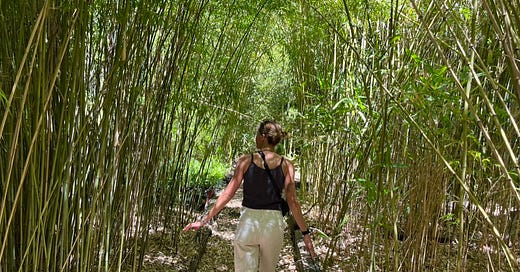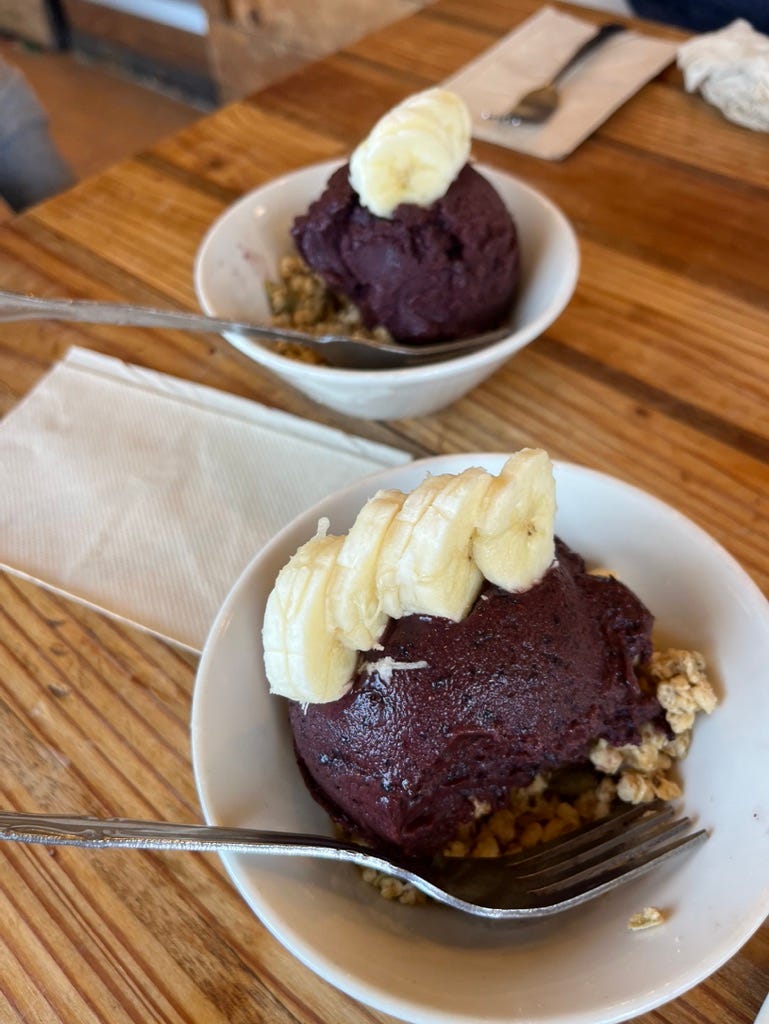Notes About Nothing #13
being good at tennis must be fun, our comparative brain can be dealt with, and vacation skills can be improved
Greetings, and happy National Ice Cream Day. The dairy-free stuff has gotten good enough if you do some sampling, I promise.
Notes:
I’m glad I didn’t have to be in London today, even though that would have been really cool.
I think we’ve all been thinking a lot about technology's role in our lives, both currently and in future years, decades, and beyond. I have several reservations, but today I am particularly grateful for WatchESPN’s replay function, which allowed me to watch the 4th and 5th sets of a particularly enthralling Wimbledon final after it had taken place in the “real world.” I am also grateful to Carlos Alcaraz for spending five-plus grueling hours to show us that 1) Novak Djokovic is, indeed, a mortal human being and 2) there’s nothing quite like seeing people who are masters at what they do give everything they have in the spirit of competitive love for their craft.
Both of these points were affirmed in both players’ post-match interviews (Novak, Carlos). The respect between two world-class opponents separated in age by sixteen (!) years made me smile so big, and I felt satisfied adding another notch to my watching-sports-is-extremely-worth-my-time belt.
Kati Devaney is really good at talking about neuroscience and meditation.
It’s worth repeating that one does not have to be Buddhist to engage in different forms of meditation, though the history and lessons taught are worth exploring in my pedestrian opinion. In fact, meditation impacts the mind-body in several ways regardless of your belief systems, which is neat.
Kati—Board VP & Executive Director at The Alembic and wearer of several other hats1—broke down one such impacts on the Deconstructing Yourself podcast, of which I am a big fan (Spotify, website). I recommend you go to about 16:30 to hear Kati explain in her own words, but here’s an attempt at what has stuck with me days later:
Your brain is taking in a ton of information all the time. You can’t possibly process all of it, so your brain filters it and picks out certain things. These things create a certain type of model for different contexts (school, bathrooms, being on a plane) that allow your brain to engage in something called predictive processing anytime you’re in that context again. Next time you go to the bathroom, your brain is expecting things to be a certain way and for your actions to (generally) follow a certain pattern. This extends to *all* contexts, especially one’s you’re exposed to a lot.
This predictive processing creates a sort of “checker” in your brain. In other words, next time you go to the bathroom your brain checks to see “is the environment and what’s going on in the environment generally in line with the model we’ve built from previous experiences in this context?”
If things go differently2, your brain can update its predictive model for that context. Really interesting in terms of the parts of the brain that become activated in this special ready-to-update state, but less important for the meditation-effect part.
A lot of us are running this checker incessantly, and in some sense, it means we’re not really where we are and being as present as we can be. We’re taking in information from our environment and checking it against our predictive model for how we think things are supposed to be going—our model subconsciously fills in a ton of gaps based on what we’d expect. This is pretty cool in and of itself, but it could mean we’re in a virtual reality of sorts, living in our predictive world, not fully looking at what is. Importantly, when things don’t line up with our checker, this can create tension, different degrees of suffering, and, I’d imagine, a potential to be less receptive to the reality of a situation. Since we imagine it and expect it to be a certain way, we might be less able to engage with (and even embrace) what is really there. And what is really there might be beautiful, insightful, or simply important to see without as many filters from previous contexts.
Kati theorizes that meditation can help us quiet, or even turn off, the “checker.” Rather than constantly compare our reality to what we expect to see/feel/experience—which can create agitation or, at the very least, a lesser ability to engage fully with an everchanging world—we can just be in our reality, more open to new inputs and able to experience them with fewer labels or ideas of how they should be.
Of course, it’s really important to use predictive processing in our daily lives. Otherwise, we’d probably be overwhelmed with information overload all the time. But in the world we live in, the ability to engage with new contexts, people, environments, etc. with a degree of lightness, freshness, and openness is (and will be) really key. *Heads to the cushion*
My family is slowly mastering the art of being together.
The parents, siblings, and family-to-be recently gathered up in coastal Bodega Bay for several days. We shared a big Airbnb near the beach. We took things slow, made each other coffee, gave ourselves ample alone time, ate when we felt like it, worked on anklets, saw wondrous trees, stumbled upon a bamboo sourcery, and shouted with nervous anticipation as we ran toward the freezing waves for our daily ocean dips. I cherished every moment.
This stands in contrast to previous vacations involving hotels with separate rooms, stricter timelines, and generally more of an urge to do. I’m not saying the schedule shouldn’t be different depending on the place you’re in—Bodega Bay is sleepier than Montauk, which is saying something, and if you’re sightseeing in Europe you probably want to book a tour or two. But I am saying that I really enjoyed our collective awareness of how nice it was simply to be together, with joint exploration as an amazing addition. We knew that asking ‘Would you rather’s’ while lying on the carpet was just as awesome as the sun-soaked Santa Rosa vineyard tour, and that’s something we (or at least I) didn’t always fully appreciate. Huge factors I haven’t mentioned are the rising maturity level of my siblings and me, and the fact that I see my family much less than every day. Regardless, I think we nailed this one.
Post-vacation impending work vibes are important vibes.
Time with the family meant time not working, and while on vacation I read a serendipitously timed newsletter whose contents have remained in my head since. Alice Lemee, author of Internetly, introduced me to the Vacation Test:
Although being a freelancer is a melange of poisonous doubts and “what ifs”, I know I’m on the right path because work passes what I call the Vacation Test.
Simply put: after vacation, how do you feel about opening your laptop?
To pass with flying colors doesn’t mean you’re stoked about returning to work (you’re human, after all). Instead, passing means you feel…calm. There’s a twinge of excitement to continue your projects. You’re curious about what your co-workers and clients have been up to. You’re brimming with ideas.
If you can pass that test, good news: you’re on track with the work you should be doing.
I thought this was a pretty simple and profound way to assess how one generally feels about their work, even if it doesn't take place on a laptop. If there’s utter dread, a pit in the stomach, that’s probably not a signal to ignore. And as Alice says, the feeling doesn't have to be one of ecstatic bliss. Is there something you’re looking forward to? Something you want to dive back into, or people you want to hear from after time away? There are probably a ton more variables that create one’s return-to-work vibes that I’m not accounting for, but I’m giving you, reader, permission to adapt this test to your liking.
A quote to close us out:
“HAPPINESS. — A butterfly, which when pursued, seems always just beyond your grasp; but if you sit down quietly, may alight upon you.”
- L. in The Daily Crescent
Copied bio: Kathryn Devaney, Ph.D. is a neuroscientist and meditation practitioner, with over 20 years of meditation experience. Kati earned her PhD in 2018, using fMRI to examine attention and default mode network function in experienced Vipassana meditators. After completing her postdoctoral fellowship at Harvard Medical School, Kati moved to Berkeley CA to start The Berkeley Alembic Foundation with Michael Taft and Erik Davis. Kati is currently the Executive Director of The Alembic, the Chief Science Officer of Jhourney.io, and a researcher at the UC Berkeley Center for the Science of Psychedelics.
Within a particular *range* of different. Like, different enough to perk up your brains model-making machinery but not incomprehensibly different, like seeing a Gorilla in your bathroom.





Simply beautiful and helpful
A lovely blog from an absolutely lovely trip! Being an incessant checker myself, I love the advice! 💜